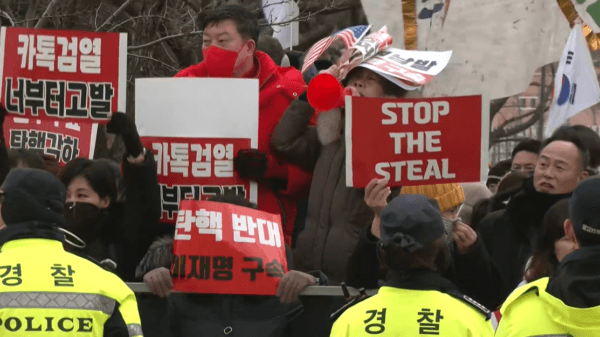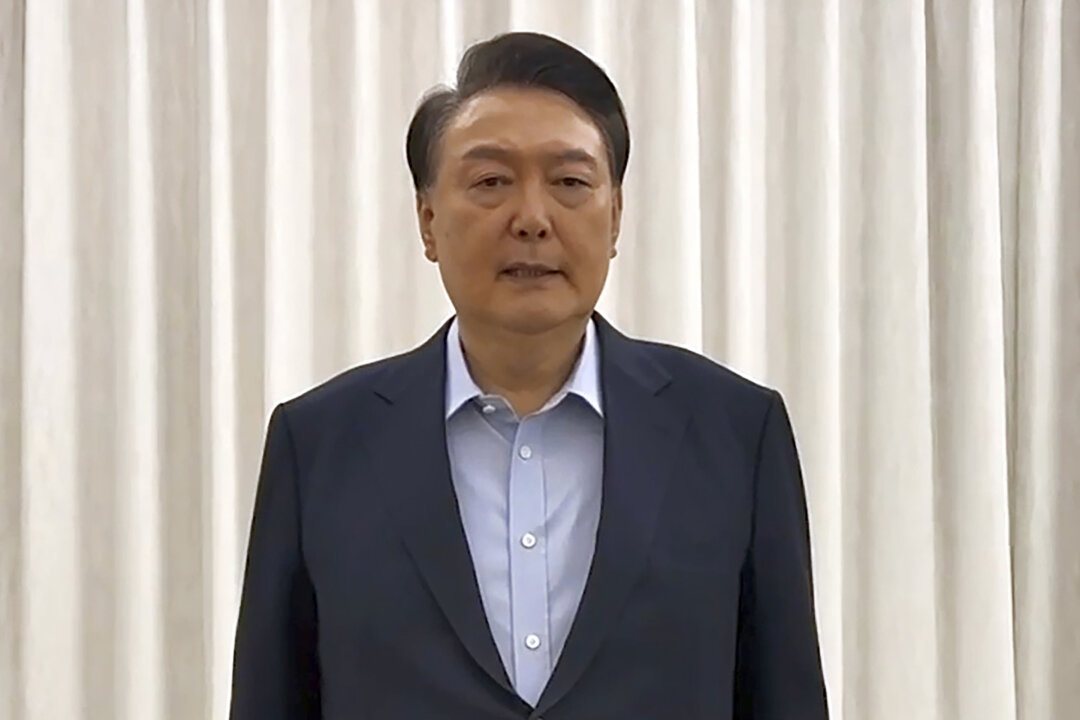Police are threatening to arrest dozens of supporters of President Yoon Suk Yeol who entered a court building in Seoul on Sunday and damaged property.
South Korea’s impeached President Yoon Suk Yeol refused to be questioned on Monday from investigators looking into allegations of rebellion over his ill-fated declaration of martial law on Dec. 3, 2024.
Yoon, 64, was seized on Jan. 15 after 3,000 police officers climbed over barbed wire at the presidential compound to serve a warrant issued by a court following a request from the Corruption Investigation Office for High-Ranking Officials (CIO).
Yoon’s refusal to appear for questioning follows a pattern of refusing to cooperate with the investigation into his decisions on Dec. 3.
Yoon is currently suspended from office, awaiting a court decision on potential permanent expulsion after lawmakers voted to impeach him.
Around midnight on Sunday the South Western District Court formally approved his detention, which led to violent scenes.
Hundreds of Yoon’s supporters, many of them brandishing “stop the steal” banners, broke into the Seoul Western District Court building around 3 a.m. on Sunday, damaging property and clashing with police.
Some of the protesters were armed with fire extinguishers, and others were seen in video footage posted on social media, roaming the halls of the building, calling out the name of the judge who approved the warrant.
Chun Dae-yup, the head of the National Court Administration, said the protesters forcibly entered at least one judge’s chambers.
The Seoul Metropolitan Police Agency (SMPA) said they are planning to arrest 66 people accused of trespass, obstruction of official duty and assaulting police officers, according to Yonhap news agency.
Acting Justice Minister Kim Seok-woo told a parliament judiciary committee the police hoped to identify others involved and take action against them.Several of the protesters live streamed the incident on YouTube. Several were arrested by police during their broadcasts.
Security has now been strengthened at the Seoul Detention Centre, where Yoon is being held, and at the Constitutional Court, which will be the venue for his impeachment trial.
Acting President Choi Sang-mok criticized the “illegal violence” at the courthouse and urged police to prevent a repeat of the incident.
Later on Sunday, Yoon was formally processed for detention, which included having a police mugshot taken.
Yoon issued a statement, through his lawyers, in which he said he described the actions of his supporters at the court building as, “shocking and unfortunate.”
But Yoon said he understood many of them were exhibiting feelings of, “rage and unfairness.”
Yoon’s lawyers have argued his arrest last week—which followed a first attempt on Jan. 3, which was blocked by presidential guards—and the warrant issued for his detention are illegal, because they were backed by a court that is in the wrong jurisdiction.
They also argue the CIO itself has no legal authority to conduct the investigation.
Yoon, a former public prosecutor, was elected president in March 2022 on the conservative People Power Party (PPP) ticket.
He narrowly defeated Lee Jae-myung, the party of the liberal Democratic Party (DP), which continues to dominate the National Assembly.
On Dec. 3, Yoon invoked martial law, saying leaders of the DP were sympathizing with communist North Korea, and engaging in “anti-state activities plotting rebellion.”
Hundreds of troops and police officers were deployed to the National Assembly, but lawmakers refused to approve Yoon’s martial law decree, forcing him to reverse the decision.
The incident caused alarm worldwide, particularly in the United States, which has counted South Korea among its allies for decades.

South Korea has had a democratic government since 1987, with the last military coup being in 1980.
Under the constitution of South Korea, presidents have wide-ranging immunity from prosecution but that does not include the charge of insurrection, which Yoon faces.
Technically it is an offense for which the death penalty could apply, although South Korea has not executed anyone since 1997.
In 1998 then President Kim Dae-jung introduced a moratorium on executions, and this included notorious criminals like serial killer Kang Ho-Sun, who was sentenced to death in 2009.
Reuters contributed to this report.

